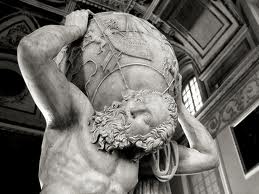My main event this summer has been working my way through the final bits of my book-in-progress, Shipwreck and the Ecology of Globalization. A lively side-bar has been exploring a useful theorist for ecological globalization, Peter Sloterdijk.
Since my German isn’t up to the task, I’ve been keying off the useful Sloterdijk in English page that I found via Stuart Elden’s blog. There’s lots out there, and more in the pipeline. Terror from the Air, Rage and Time, and Stuart Elden’s collection Sloterdijk Now (2012) are sitting on my desk right now, and Spheres I is on its way. Neither Sun nor Death made a good introduction to the entire corpus.
The key work for my purposes, I think, will be Spheres vol 2: Globes, which isn’t out in English yet, but I’ve found a selection from it published as “Geometry in the Colossal: The Project of Metaphysical Globalization” in Environment and Planning D: Society and Space 27 (2009): 29-40. (It’s a translation by Samuel Butler of pp. 47-72 of Spharen II — Globen [Suhrkhamp, 1999].) It’s pretty exciting stuff & will make an appearance in the opening pages of the Shipwreck book, as well as at a talk I’ll give at GW MEMSI this coming fall.
Especially engaging for my purposes is Sloterdijk’s desire to locate globalization both as a historical phenomenon, linked to the maritime expansion of European cultures in the 15-17c, and also to see its influence enfolding in much earlier, and later, eras. It starts with Greek geometry:
If one were to express, with a single word, the chief motif of European thought in its metaphysical age, it could only be ‘globalization.’ The affair of Western reason with the totality of the world is created and unfolds in the symbol of the geometrically perfected round form, which we still signify with the Greek ‘sphere’, or more frequently with the Latin ‘globe.’ (29)
Geometry prefigures geography:
Globalization of sphereeopoise in general is the fundamental event of European thought, one that has not ceased to provoke revolutions in the thought and life relations of humans for two and a half thousand years….Mathematical globalization proceeds [sic] terrestrial globalization for more than two thousand years. (30)
In this totalizing perspective, which seems exaggerated but stimulating, spherical thinking shapes Western culture:
The representation of the world with the globe is the decisive deed of the early European enlightenment…the radical change to monospherical thought…the unity, totality, and roundness of existence…first comes the sphere, then morality (31).
I like the pressure Sloterdijk gets from abstraction here, the sense that an imagined form — the sphere as geometric absolute, a creature of the mind — puts pressure on lived historical experience. I don’t really believe pre-geometric or pre-Greek cultures were innocent of morality — what could that mean? — but I think the geometric imagination shapes (pardon the pun) cultural ideas about wholeness, centered-ness, conceptions of substance and weight.
This project is interesting to me because Sloterdijk also focuses on early modern maritime globalization. In his sphere-centered understanding, maritime expansion becomes less a question of radical “discovery” than of putting into physical practice a vision that has long been accepted & watching that vision assume tangible form:
…the fundamental thought of modernity was articulate not by Copernicus, but rather by Magellan. The fundamental fact of modernity is not that the earth orbits the sun, but rather that money circumnavigates the earth. The theory of the sphere is, at the same time, the first analysis of power. (33)
In making use of this material, I’ll want to tone down and refigure the “modernist break” language here, since globalization seems much more a “time knot” than a historical break: money circled much of the Eurasian / African world before Columbus & Magellan, and the epoch-hunting of “fundamental thoughts” seems a profitless game. But I agree that the conceptual unity of the globe assumes a changed resonance after maritime expansion into the New World, and especially after the establishment of global trade routes between the oceanic basins. It’s not the “invention” of something new, but the progressive re-interpolation or knotting together of old and changing things.
The core of Sloterdijk’s article / selection is detailed reading of the first-century Farnese Atlas, a Roman statue made after a presumed Greek original, now in Naples. Atlas supports a celestial globe on which half of the known constellations of the ancient world are visible (36); it’s the heavens, not just the earth, on the Titan’s laboring back.
Sloterdijk reads this Atlas as a philosophical athlete, because
a philosopher is one who, as an athlete of totality, is laden with the weight of the world. The essence of philosophy as a form of living is philponia — friendship with the entirety of weighty and worth things. The love of wisdom and the love of the weight of the one whole are unified (39).
In Neither Sun nor Death, Sloterdijk has a few nice oceanic nuggets that I might be able to use also —
People born today do not develop any oceanic consciousness — neither in the phobic nor the philobatic sense (239). (Cf At the Bottom, pix-x)
Moreover, from a historical viewpoint, the opposition between thinkers of down-to-earthness and thinkers of maritime situations remains pertinent — it is a contrast that has not ceased to widen since 16000. This division between these two types of thinkers is one of the most important factors in the psychodrama of modern reason….Among the theoreticians of emergent maritime situations the towering authors all lived in port towns — and this is no coincidence — whether we are talking of Montaigne, who, from Bordeaux, had a view of the Atlantic, or of Bacon, who, like a Pliny of early capitalism, even wrote a history of the wind (239).
A collective biography should be written of about the lives of those infamous men of the sea, those newly desolate people for having slipped out of our historical memories (241). (Cf Marcus Rediker)
Terrestrial globalization is the common work of astronomers, mathematicians, trades, mariners, and a plethora of dubious figures (198).
To which last group I’d add poets, playwrights, and other writers.
I’ve got lots more Sloterdijk to read, but it’s fun to get started.


[…] Professor Steve Mentz has an interesting post on how Sloterdijk relates to his book-in-progress Shipwreck and the Ecology of Globalization. I […]